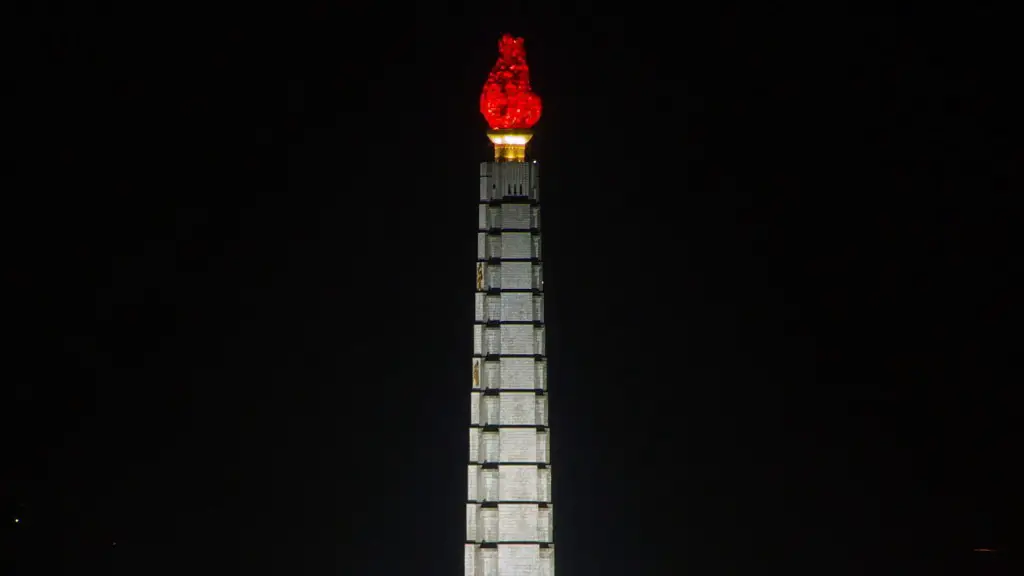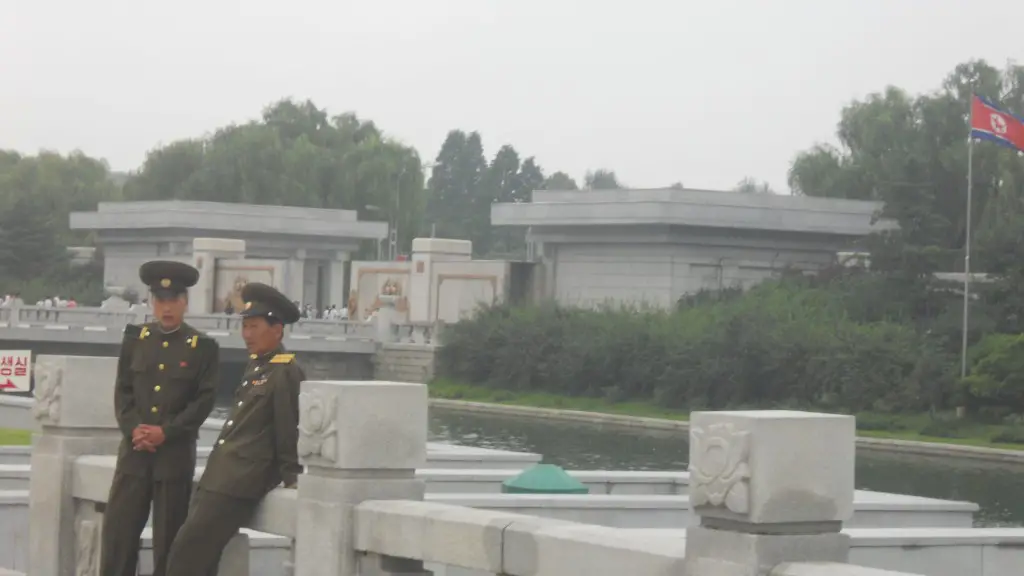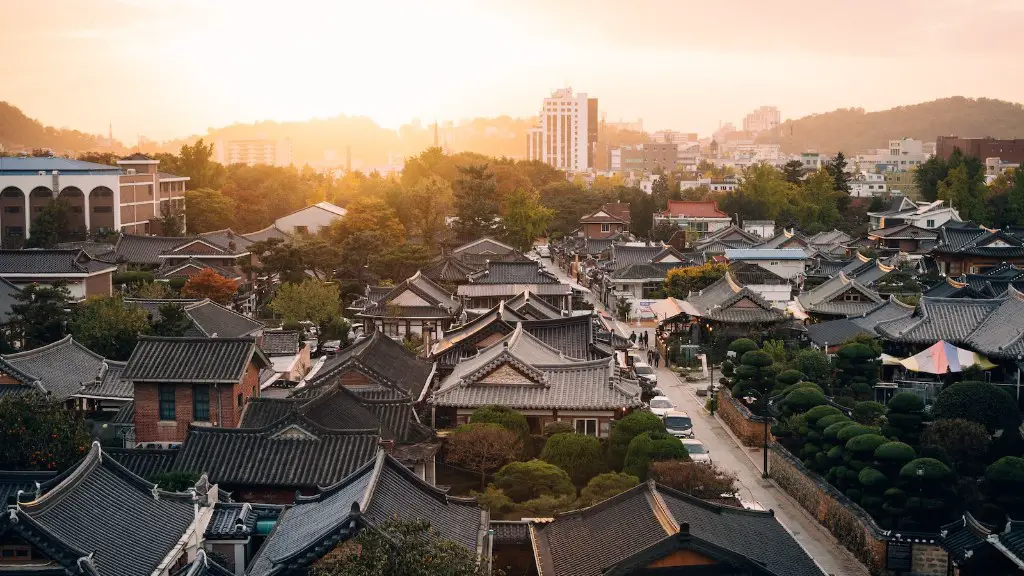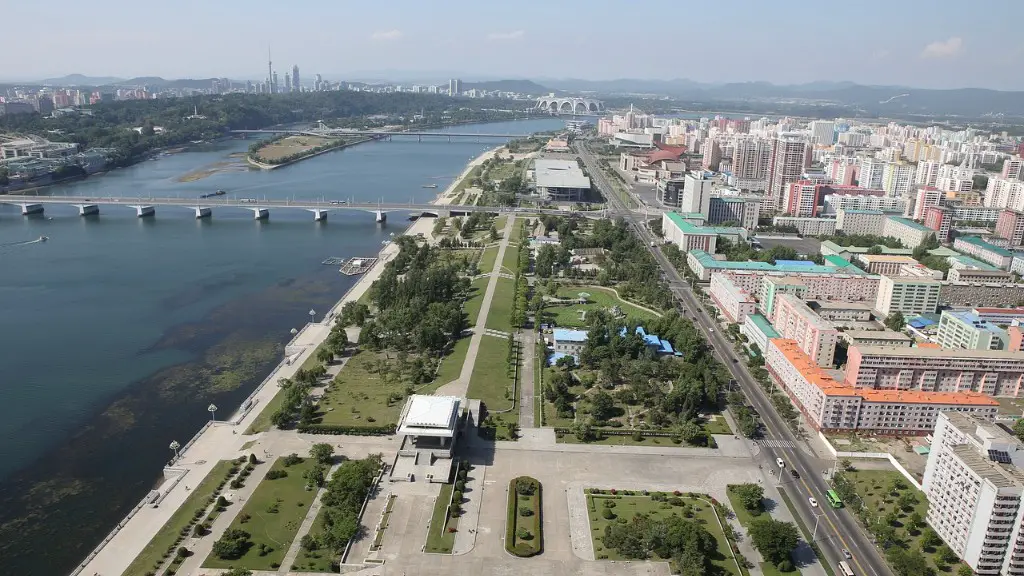Historical Background
One of the oldest and most intractable conflicts in the world today is the rivalry between North Korea and the United States. Since the end of the Second World War, the two countries have been in a state of near constant hostility, with both sides viewing the other as a threat. This dislike and distrust has been the source of many issues over the years, and it only continues to grow.
The primary source of this animosity can be traced back to the Korean War. After World War II, Korea was divided into two parts – the north, which was governed by the communist Soviet Union, and the south, which was supported by the Western powers. In 1950, the North Koreans invaded the South, sparking a brutal war that lasted three long years.
The conflict ended in a draw, but it had a deep and lasting impact on North Korea. Before the war, it had been a prosperous, developing nation, with strong ties to the rest of the world. But after the war, the North became an isolated and isolated nation, cut off from the outside world due to its alignment with the Soviet Union.
The Post-Cold War Era
After the collapse of the Soviet Union in the 1990s, North Korea’s relationship with the West remained strained. It remained an isolated, secretive nation, with a heavily militarized border and an economy reliant on foreign aid. Many nations viewed North Korea as an unpredictable, dangerous regime, particularly the United States.
During this period, North Korea was developing a nuclear weapons program. This alarmed the international community, as it could give the regime unprecedented power and an ability to threaten its neighbors. In response, the United Nations imposed a strict regime of sanctions aimed at curbing the Pyongyang’s nuclear ambitions.
The sanctions were effective at first, but they also further strained the already tense relations between North Korea and the West. In particular, North Korea was angered by the US’s insistence that it abandon its nuclear program. This continued throughout the Bush and Obama administrations.
However, the election of Donald Trump in 2016 has seen relations worsen significantly. Trump has become known as a hard-liner on North Korea, and has made several public verbal attacks on the regime and its leader, Kim Jong-un. This has only stoked the North’s distrust and anger towards the United States.
North Korea’s Perception of America
From North Korea’s perspective, the US has long been a hostile nation – a perceived enemy that is constantly trying to undermine its way of life. The American military presence in South Korea has been seen as a threat and an invasion of their sovereignty. The US has been accused of imposing economic sanctions that are damaging to the North Korean people, while also supporting regional powers, such as Japan, that Pyongyang views as hostile.
In the eyes of North Korean leaders, the US is a threat to the very survival of the regime. They point to America’s past interventions in countries such as Iraq and Libya, and argue that the US is an imperial power that wants to dominate the world. North Korea is also acutely aware of the power of the American military, which it sees as a potential threat to its own security.
This perception is further compounded by the political rhetoric coming from the US. President Trump’s fiery descriptions of the North Korean regime have been seen by Pyongyang as a direct threat that could lead to a military confrontation. As a result, North Korea has become increasingly hostile towards America.
Cause of Aggression
It is clear that North Korea has a deep and abiding mistrust of the US, which has only grown over the years. However, it is also important to consider why the North has become so aggressively hostile to the US. There are several potential factors.
The first is the sense of insecurity felt by the North Korean Government. It is well aware of the power of the American military, and is paranoid about the potential for an invasion. As a result, it is willing to take extreme measures to protect itself, including the development of nuclear weapons and the testing of long-range missiles.
The second factor is a deep-seated resentment of US policy. North Korea has long been a victim of economic sanctions, and it is no surprise that it has grown to resent the US. In addition, more recently, it has been angered by the US’s unwillingness to engage in negotiations.
Finally, the third factor is the personality of North Korea’s leaders. Kim Jong-un and his predecessors have all been intensely nationalistic, and they have taken a hard line stance against the US. This has caused a cycle of hostility that has been difficult to break.
Impact on the Region
The continuing animosity between North Korea and the US is having a major impact on the region. The North’s nuclear program has caused alarm in South Korea, Japan, and beyond. The UN has imposed strict sanctions, but these have not had a significant impact. In addition, North Korea’s increasingly provocative rhetoric and missile tests have only increased tension.
The ramifications of a potential conflict between North Korea and the US are too dire to contemplate. Millions of lives could be at risk, and it is essential that the two sides find a peaceful solution to the problem. It is clear that the root cause of the issue is the entrenched mistrust between the two nations, and it remains to be seen if this can be overcome.
Rising Tensions
More recently, the situation has worsened, with both the US and North Korea trading threats and insults. This has led to a raised level of tension between the two sides, and a heightened risk of conflict. In particular, the prospect of a pre-emptive US military strike against North Korea has become increasingly likely.
This is a worrying development, and it is essential that all sides exercise restraint. However, although there is still a long way to go before full détente is reached, it is possible that a diplomatic solution can eventually be found.
The recent meetings between the two sides have been encouraging, and there have been signs that North Korea is willing to discuss the issue of denuclearization. This could be a major step forward, and it is to be hoped that it will eventually lead to improved relations between the US and North Korea.
Barriers to Progress
Given the deep hostility between the two sides, it is clear that there are still major barriers to progress. The mistrust and resentment felt by both sides is a major obstacle to rapprochement, and both sides are wary of making concessions. In addition, the US’s insistence on denuclearization as a precondition for dialogue is seen by Pyongyang as an unacceptable intrusion into its sovereignty.
Furthermore, the US has been unwilling to offer the North any incentives, such as the lifting of sanctions or economic aid. This has only served to harden the regime’s stance against the US, and it has pushed the two sides further apart. It is clear that there is still much work to be done before the North Korea-US conflict is finally resolved.
Public Opinion
The North Korea-US conflict has also become a major issue in public opinion polls. The American public is largely critical of Pyongyang’s rhetoric and policies, and is concerned about the regime’s nuclear ambitions. At the same time, there is a sense that the US should be more open to dialogue and willing to negotiate in good faith.
The Korean public has also been affected by the ongoing hostilities. Many feel a strong sense of distrust and resentment towards the US, which they feel has not done enough to support the peace process. It is also clear that the South Korean people are worried about the potential for a conflict with North Korea.
Finally, the international community is also worried about the North Korea-US conflict. It is concerned about the potential consequences of a confrontation, and is urging both sides to engage in dialogue and find a peaceful solution to the crisis.





